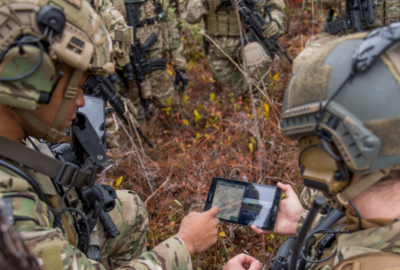
Special Forces members get special treatment from this group when they leave the military
Members of the military special forces can do extraordinary things. But eventually they muster out, with little preparation for work in the private sector. That...
Best listening experience is on Chrome, Firefox or Safari. Subscribe to Federal Drive’s daily audio interviews on Apple Podcasts or PodcastOne.
Members of the military special forces can do extraordinary things. But eventually they muster out, with little preparation for work in the private sector. That’s where the Tampa, Florida based STAR network comes in. STAR stands for Special Operations Forces Transition Assistance Resource. It’s a group of executives who volunteer to help SOF members while pledging to hire them. One new member of the STAR network joins me now. She’s the CEO of Naviga Recruiting and Executive Search, Kathleen Steffey.
Interview transcript:
Tom Temin
And you’re in Tampa, Florida. And so this is where a lot of the SOF, Special Operations Forces members kind of discharged into the world safe to say?Kathleen Steffey
Safe to say there’s tons of them here at MacDill Air Force, and they’re just waiting to get out.Tom Temin
Well, it’s hopefully like it while they’re there. But they’re, once they step out, they need help. And tell us about STAR? How does it work? And what are some of the activities that support these members as they transition to becoming veterans who want to work because they’re mostly relatively young?Kathleen Steffey
Well, actually, the target audience for STAR is your 20 to 25 year, Special Forces leaders that are coming out, that’s kind of what when I said, it’s time for them to come out, or they’re waiting to come out by 20 to 25 years they want to. So STAR Network is really focused on networking, you know, with them with business people in the Tampa Bay area, and helping them having one on one coffees, talking about the transition, what do they want to do? What do they need to do to actually make the job of their dreams if you will happen on the civilian side, and so on, and so forth. So it’s a pretty deliberate mission that we have with the SOF guys.Tom Temin
And it sounds like given the company that you operate, you can kind of benefit in a sense, because you can make those connections between corporations that need these people. And the fact that you’re in the recruiting business, and you’re working with them as they come out. Maybe that makes you a connector.Kathleen Steffey
Yeah, I’m a huge connector. But I will tell you what I’m doing is all pro bono, if you will, I am educating employers in the marketplace really all over the world who can hire these guys here in Tampa, about them. And they want to know about them. They want to know how can they hire them. They want to know how they can have a shadowing with them as an employer. So there’s an education going on that I’m kind of facilitating just from my heart, if you will, and I’m loving it.Tom Temin
And in the Tampa Bay area, I imagine there are offices of the major defense contractors that may not be headquartered in Tampa. But are they also have presence in Tampa? And is that part of the target here to get them into those companies? Or give us the range of where they might end up as they come out of special forces?Kathleen Steffey
Yeah. So when I sit down with SOF leadership, this is what happens. So the number one thing that I hear is that they have these defense contractor opportunities without question they can walk in, blindfolded, right. And they have these opportunities from former SOF guys that are now running businesses, and yet they could get plugged in. But they don’t want that. They don’t want that. So they say to me, what, what else can I do? I don’t really want this. It’s a shoo in. It could be good money. But well, what else is out there and they don’t know how to go find the other types of civilian jobs out there versus what you’re talking about. It’s a shoo in. Yes. But they don’t necessarily want it.Tom Temin
That’s an interesting insight, what typifies what they might want, just give me some examples.Kathleen Steffey
Yeah, they want a fresh start. They don’t want to keep on the military track. You know, some of them go into sales. Some of them go into boating, if you will, in running charters, you know, the SEALs say, I do kind of want to go along my passion and do something around water, you know, and they do things with a communal boat club that we have here in Tampa, Freedom Boat Club. So it’s just a variety of different things. They don’t know what they don’t know. So most of them have no idea what they want to do. But they know they want change. They don’t want to continue on the military path. And that’s the dynamics here that we’re dealing with.Tom Temin
Interesting. Yeah, we’re speaking with Kathleen Steffey, she’s CEO of Naviga Recruiting and Executive Search of Tampa, Florida. And she is also part of the STAR Network, which helps people leaving Special Forces. But I want to emphasize the fact that that doesn’t mean they need to stay in Tampa and go into some other commercial line of work outside of the military, they could end up in anywhere. That is to say, do you have resources to help them? Perhaps relocate, but yet not go into the military industrial complex?Kathleen Steffey
Exactly, exactly. They need help. They need help, many are interested in relocating, many want to stay in Tampa, by this time their families are done moving around, right? So they want their last stop. So this is the mindset, you know, and they’re so talented, there’s so much depth to them. I mean, these are the top of the line in the military, top of the line. So lots of opportunity for employers to benefit from them.Tom Temin
And what should employers know about these people?Kathleen Steffey
That they are astounding, I’m going to go into how. They, their leadership skills and what they’ve managed, in their roles and the decision making, that they go through their fast decision making the big decisions, these life and death decisions, the planning for their team. It’s extraordinary. And they take these kind of leadership skills over into the operation side of civilian businesses. And they can manage a project like you’ve never seen before, or manage an operation like you’ve never seen before. Many of them go into the civilian side of business and say, gosh, this is easy compared to what I’ve done, you know, but the transition is the hard part. A lot of these guys would choose, you know, to put a plan together to have their team pound on the door and go, you know, attack and kill our enemies, then actually go in transition and learn how to do that. This is one of the toughest things that they have to do in their lives. So it’s stressful.Tom Temin
You go from wrecking things and killing people to pleasing the customer. That’s a different mindset.Kathleen Steffey
Or building a business.Tom Temin
But there might also be challenges. I mean, if you give an order in Special Forces, or receive an order in Special Forces, you follow that order? Pretty much without question, if you order a Gen Z person to do something without question, you’re gonna get questioned.Kathleen Steffey
That’s true. That’s true. There can be challenges, but they’re, they’re great order takers. The operators are, most of them that I’m dealing with are leaders, and people that are setting direction setting tone, laying the plans, you know, rallying the troops, if you will, collaborating to make huge decisions, you know, so those types of skill sets are transferable over in business, and they get it done. They get it done.Tom Temin
So would you say perhaps I’ve over emphasized or over drawn? The difference between the military setting and the commercial setting with respect to the skills that special operators actually have?Kathleen Steffey
Possibly, you know, possibly, there’s so many connecting dots, you know, there’s so many differences, but there are so many connecting dots, and the businesses that go forward and pull the trigger with these guys benefit, without question. So there’s a lot they can offer.Tom Temin
And you have a mechanism that is through the STAR, you know, the resource network there to find out how they’re doing after they have been placed. I mean, could they come back and say, geez, I had no idea of you know, what it was like in the private sector? And or whatever they may, they may find they love it.Kathleen Steffey
Yeah, absolutely. So STAR is made up of networking with SOF guys through dinners every second Tuesday of the month. And what happens is they’re teamed up with a business partner. And these are alumni and actual guys that are coming out. So be alumni speak at these dinners and tell everyone how it’s going and kind of give their perspective and a path for those that are leaving. So it’s a great way to check in as they come in, in person. And we’re actually asking face to face but then there’s ongoing connections with these business leaders in the Tampa Bay area. Just to touch base how are they doing and things of that nature so there is an incredible foundation I’m not sure if you know about it called the Honor Foundation. There’s one in Virginia Beach, San Diego and now in Tampa, just for transitioning SOF guys. And it’s a rigorous three months, like two times a week program that gives these guys the tactics to actually go get a job and find out what they want to do. It’s incredible. So the STAR network is connecting relationships with that foundation and working together with them with these guys here in the Tampa Bay area.Tom Temin
And the Tampa Bay area is what maybe half a million, 600,000 people? Greater Tampa, you know, Tampa itself is less than half a million. Any thought of replicating this type of thing in some of the big cities where there are also major military areas that are putting people out, you know, as veterans regularly?Kathleen Steffey
Yeah, yeah, there are private programs and volunteer programs just not under the STAR umbrella. And I’m a volunteer with STAR, I don’t run STAR, but I am very active every single month. And I do a lot with these guys privately as well.Tom Temin
All right, sounds like you enjoy it.Kathleen Steffey
I love it. I love it. I hired my first veteran for my business in October because of this network and because of what I’ve learned about veterans and what they can bring to the table, so it’s pretty cool. I’m very passionate about it.
Copyright © 2024 Federal News Network. All rights reserved. This website is not intended for users located within the European Economic Area.
Tom Temin is host of the Federal Drive and has been providing insight on federal technology and management issues for more than 30 years.
Follow @tteminWFED
Related Stories





